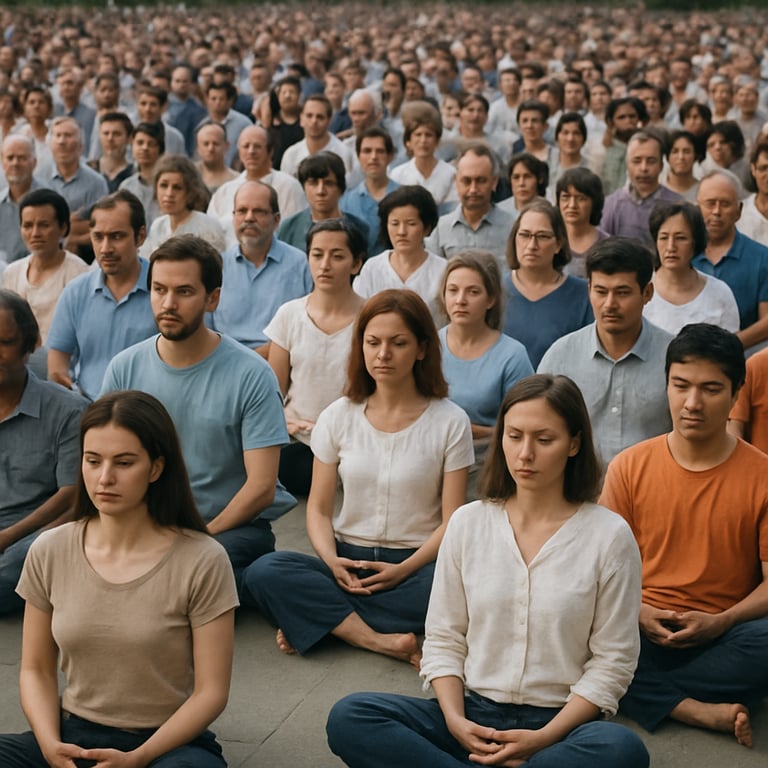The Inner Teacher Blog
Can Mass Meditation Make Cities Safer?
The Inner Teacher Blog
Can a group of people sitting quietly with closed eyes change the atmosphere of an entire city? The idea sounds mystical, maybe even far-fetched. Yet for decades, researchers and meditators—especially within the Transcendental Meditation (TM) tradition—have suggested that large numbers of people meditating together can lower crime, reduce violence, and even soften political tensions.
Let’s look at what the science actually says.
The Bold Claims
The most famous example comes from Washington, D.C., in the summer of 1993. During a two-month experiment, around 4,000 TM practitioners gathered to meditate daily. The study, published in Social Indicators Research, reported that violent crime dropped by as much as 23% during the peak weeks, after controlling for weather and seasonal factors.
Other TM-affiliated studies have suggested a “√1% effect”—meaning if the square root of 1% of a population meditates together, the whole population benefits. Some reports claimed homicide or violent crime rates fell in U.S. cities and even at national scales when large meditation assemblies were held.
If true, these would be seismic findings: that inner stillness could ripple outward into collective safety.
The Scientific Pushback
But extraordinary claims need extraordinary evidence. And here’s the rub: nearly all of these studies come from researchers tied to TM organizations. Independent replication is scarce.
Critics point out that the methods rely on complex time-series models—essentially fancy statistical curves—that can be sensitive to choices about time windows, control variables, and outcome definitions. Crime data naturally fluctuates due to seasonality, policing strategies, economics, and countless other factors. Without randomized control, it’s hard to prove that meditation caused the drop.
Skeptics argue the reported effects are implausibly large—double-digit declines in crime within weeks. That scale of change, if real, should be visible in independent datasets, but so far hasn’t been robustly confirmed.
What We Do Know
On the individual level, the evidence is strong and consistent: meditation can increase compassion, empathy, and prosocial behavior. Randomized controlled trials and meta-analyses show that even modest daily practice can nudge people toward greater patience, generosity, and calm.
These effects are meaningful. While they don’t guarantee citywide drops in crime, they do suggest that meditation makes us a little kinder—and multiplied across thousands or millions of people, that can’t be trivial.
Why the Question Still Matters
Even if the “group meditation lowers crime” hypothesis hasn’t been decisively proven, it raises an inspiring point: human consciousness may be more connected than we think. At minimum, mass meditation events demonstrate unity, peacefulness, and shared intention—qualities society sorely needs.
And science is still evolving. With better designs—multi-city studies, preregistered methods, independent teams—we may eventually get clearer answers.
Bringing It Back to You
So, can mass meditation make your city safer? The jury is still out. But can it make you calmer, more compassionate, and more resilient in the face of chaos? Absolutely.
And imagine: if each of us cultivates just a little more inner peace, then ripples of kindness and patience spread outward—to families, workplaces, and communities. That’s no small thing.
✨ Practical Way Today: Try sitting for ten minutes with your breath. Let stillness fill you. Then, when you go back into the world, carry that gentleness with you. The world may or may not change overnight—but you will, and that’s the beginning of something powerful.


© 2025. All rights reserved.
If you find information on this site helpful, please share it with a friend. If you like to donate to the cause of spreading inner peace to the world, you can do so at my "Buy me a coffee link here. Thank you.
Live Healthy
BeatAgeWithEase.com
Live Happy
TheInnerTeacher.com
